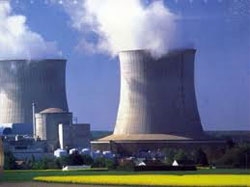Nuclear power requires public support
 |
| illustration photo |
"Including different stakeholders into the programme to share information with them and take them through different stages of the programme to see how it develops, and open and transparent communication is key for the successful implementation of the programme," junior professional officer of IAEA's Division of Nuclear Power Brenda Pagannone said on the sidelines of the Open Seminar on Public Information on February 23 .
She said an increasing number of countries were interested in developing nuclear power which she attributed to growing public approval.
"Providing information to people should be ongoing in order to achieve public consensus," said communications specialist of IAEA's Division of Nuclear Fuel Cycle and Waste Technology Mamoru Maeoka.
"It is not just one way of communication, but it should also be a dialogue between sides," he added.
The specialist said Vietnam should establish a communications strategy to meet stakeholder concerns and expectations. Stakeholders include anyone likely to be affected by the nuclear programme as well as those with a general interest.
"IAEA is ready to provide support for the establishment of the strategy and communications techniques to Vietnam," Maeoka said.
In Vietnam, people were increasingly aware of the benefits of nuclear power and public information would continue to gain their agreement as well as maintain their trust until the programme finishes, director of Nuclear Power and Renewable Project Pre-Investment Board (NRPB) under the Electricity of Vietnam (EVN), Phan Minh Tuan told Vietnam News.
He said EVN, a key investor in two nuclear power plants in central Ninh Thuan province, had paid due attention to disseminating information about nuclear power in order to gain public support.
In a recent move, the NRPB invited officials and teachers in Ninh Thuan province to visit nuclear reactors in Da Lat to see how they help experts research nuclear and neutron physics, and apply nuclear power.
"I feel that the exploitation and use of nuclear power is very safe and can help to ensure good health for operators and people living nearby the reactors," said Nguyen Xuan Gioi of the Ninh Thuan Education and Training Department.
Vo Van Nam, a teacher in Ninh Thuan province, admitted his fear of nuclear power disappeared only after visiting the Da Lat reactors.
"There is nothing to fear if nuclear power plants are operated under the proper techniques," he said. "I found that people there had no fear of even a small incident."
Elsewhere through out the country, exhibitions on the application of atomic energy for peace have been held to inform the public about the issue.
A public opinion poll conducted by the Vietnam Atomic Energy Agency found that over 80 per cent of 10,000 questioned in Hanoi believed in the safety of existing modern technology to produce nuclear power.
Yet, challenges remain as a matter of course.
A Nuclear Power and Renewable Project Pre-Investment Board report said though people in Ninh Thuan understood the need for nuclear power, their major concerns were still about the safety and local benefits in terms of tax collection, employment and infrastructure development.
"Ninh Thuan has a plan to develop tourism, so it may be difficult to implement a nuclear power programme there," said board member Nguyen Thi Van Ly.
Sharing the concern, former Commissioner of Japan Atomic Energy Commission Dr Sueo Machi said government support for development and welfare of the local community was needed in order to gain better acceptance for the construction of nuclear power plants.
In addition, training and recruitment of local people to operate and maintain the nuclear power plant was also important, he said.
Nuclear energy is the only non-greenhouse gas emitting power source currently available to effectively replace fossil fuels while satisfying the increasing demand for energy.
EVN has forecast that if the country were to rely solely on local fuel sources to produce electricity, it will fall short by 128 billion kWh of electricity by 2020.
In response, the Vietnamese government has approved construction of two nuclear power plants in Ninh Thuan province with the capacity of 4,000 MW in total.
Nuclear technology also has an important role to play in producing more productive agriculture products, early diagnosis and treatment of cancer as well as producing value added materials from radiation processing of polymers.
What the stars mean:
★ Poor ★ ★ Promising ★★★ Good ★★★★ Very good ★★★★★ Exceptional
 Tag:
Tag:
Related Contents
Latest News
More News
- Foreign fruits flood Vietnamese market (December 09, 2025 | 13:22)
- Vietnam’s fruit and vegetable exports reach $7.8 billion in first 11 months (December 05, 2025 | 13:50)
- Vietnam shapes next-generation carbon market (November 26, 2025 | 15:33)
- PM urges Ho Chi Minh City to innovate and remain Vietnam’s economic locomotive (November 26, 2025 | 15:29)
- Experts chart Vietnam's digital finance path: high hopes, high stakes (November 14, 2025 | 10:56)
- Vietnam’s seafood imports surge 30 per cent in first 10 months (November 10, 2025 | 19:35)
- Vietnam’s durian exports hit $1 billion milestone (October 30, 2025 | 17:41)
- Beyond borders: Sunhouse and new era of Vietnamese brands on Amazon (October 28, 2025 | 10:46)
- Record-breaking trade fair set to open in Hanoi (October 15, 2025 | 15:59)
- Timber sector seeks solutions to VAT refunds (October 14, 2025 | 18:58)






















 Mobile Version
Mobile Version